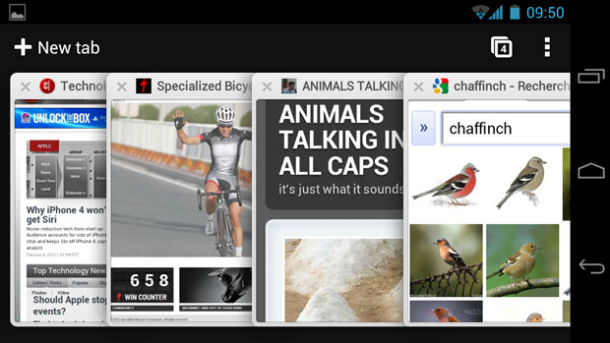
The equity research group claims that Chrome for iOS is due for several reasons, all of which can be summed up as part of the current "browser wars." These include Google's interest in reducing the amount of money it pays to Apple for each person using Google search on iOS, which is a massive cost for Google.
When asked to comment on whether an iOS version of Chrome was in the works, a Google spokesperson said, "We do not comment on rumor or speculation."
However, other points made by Macquarie's analysts are harder to take at face value. While it's true that Chrome for PCs has been an enormous success, as the firm notes, and that early reviews of Chrome for Android have also been positive, iOS is a very different beast from those two environments.
Chrome has been widely available on Windows since 2008 and Mac and Linux since 2010, and the browser gained early adoption because it offered a combination of speed, stability, and features that surpassed other browsers. While Chrome is still a driving force, it's no longer the sole leader in the field as Firefox and Internet Explorer worked harder to maintain their market share.
The Android version of Chrome is a solid, fast browser, even in beta, but it faces a very different problem: platform support. It only works on Android 4.0 Ice Cream Sandwich, currently in the one to two percent range of Android devices, and Google has said that it has no plans for making it work on legacy Android.
It's not out of the realm of possibility that Google would be working on Chrome for iPhones and iPads. Both Chrome and Safari, the iOS default browser, are powered by the Webkit rendering engine. But unlike Android, Apple doesn't let third-party browser makers change iOS' default browser from Safari. So even if you use a third-party browser on iOS as your primary browser, all links will still open in Safari, effectively handicapping any efforts to provide a true Safari alternative.
Google has also shown itself to be resistant to pushing the Chrome brand on Android. The default, nameless Android browser is Webkit powered, but doesn't bear the Chrome name in large part because it wasn't based on Chromium, Chrome's open-source foundation. It's unlikely Google would contradict itself and submit anything to Apple labeled Chrome that didn't have that Chromium core.
That doesn't mean that Chrome on iOS couldn't be useful to Google. Mozilla has a Firefox Home app, so that people with iOS can sync tabs, bookmarks, and passwords from other full iterations of Firefox. The mobile-only Dolphin has a version for iOS and Android that allows cross-platform syncing, too. Some people may feel that the limited third-party browsing experience on iOS is worth the hassle to stay with Chrome.
But even if Google is able to replicate the vast majority of the Chrome experience on iOS, the chances of Apple letting Google of all companies into its walled garden are extremely small.
